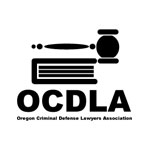Criminal Terminology & Chronology
Like most areas of the law, criminal law has an overall court process and terms which are used within the industry to describe circumstances, processes and events. Below is a general chronology of a felony and misdemeanor case in state court and a glossary of legal terms by attorneys and the courts. These legal terms and definitions will give you a general understanding of the terms and descriptions that may come up in a discussion with your attorney.
Please note that the chronology of a criminal case varies from state to state and from county to county. The general chronology is used as an overview of the steps you may go through during your criminal case.
Portland Felony Case Lawyer
The chronology of a misdemeanor or felony in court is as follows:
- Arrest - you may be contacted by the police for questioning or outright arrested. Police officers in some circumstances have the authority to issue you a citation to appear in court as an alternative to taking you into custody immediately.
- Arraignment - must take place within 72 hours of your arrest if you remain in custody (in jail) or may occur after released from jail and given a court date or you receive a citation to appear in court. This is your first opportunity to hear the charges against you and enter a plea.
- Early Case Resolution (ECR) (Washington County only) - generally held at the time of your first arraignment for misdemeanors and select class C felonies. Not all persons are eligible for ECR. Eligibility depends on the charges and a person's criminal history. Persons found eligible for ECR will be given an immediate plea offer and pressured to resolve their case on the spot by way of guilty plea without the assistance of an attorney or investigation of the facts of the case. Be wary of opting into what seems easy and speak to an attorney.
- Preliminary Hearing or Grand jury (felony only) - The District Attorney may opt to present your case to a Grand Jury or proceed to a preliminary hearing. Whichever route is chosen, the District Attorney must present sufficient evidence to either the grand jury or a judge to show probable cause to believe you may have committed a crime.
- Second Arraignment (felony only) - Generally occurs after you have had or waived a preliminary hearing or appeared for a preliminary hearing and the District Attorney has presented your case to a grand jury and indicted you on criminal charges.
- Pretrial Conference, sometimes called a "case management hearing" -- a hearing to determine whether you will resolve your case by some form of negotiated plea or will set the matter for a Jury or Bench Trial.
- Docket Call -- A hearing to report to the court your readiness for trial or the need for a reset.
- Trial by Jury or a Bench Trial - your first chance to present evidence regarding your case.
- Plea Hearing - a hearing scheduled by the court for entry of a change of plea.
Glossary of Legal Terms
This glossary of legal terms is not complete nor does it cover all circumstances. It is imperative that it be used to give you enough information to be able to comfortably converse with your legal adviser and not as an explanation of the legal adviser's statements.
| Appeal | The formal request to an appellate court to review the ruling made in a lower trial court to determine if that court's decision is accurate. |
| Appellate Court | The court that hears cases (that have been previously decided by a trial court) to determine if the trial court made the correct decision. |
| Arraignment | Typically the first appearance for a person either charged with a crime or cited into court by a police officer. A defendant's first opportunity to hear the charges they are accused of and their rights under the state and federal constitutions. |
| Beyond a Reasonable Doubt | The standard of proof by which a criminal defendant is found guilty of committing a crime. |
| Contempt of Court | An accusation made that a person has violated a court order. |
| Court Order | The court's written ruling defining the parties' rights and responsibilities regarding the subject of the order. May be drafted by an attorney and signed by the court. |
| Cross Examination | The questioning of other parties' witnesses at trial to elicit the credibility and weakness of the witnesses' testimony. The scope of cross examination questions are limited to the questions that were asked during a direct examination. New issues may not be introduced and asked of the witness on cross examination. |
| Defendant | The person against whom criminal charges have been filed. |
| Discovery | A term used to refer to the fact finding process used to uncover information, gather records and determine if disclosures are valid |
| Domestic Violence | Physical abuse or threats of abuse occurring between members of the same household or people who have been physically intimate |
| Evidence | Documentation or proof presented to a judge or jury to prove someone's innocence or guilt through witnesses, records, documents, exhibits, etc. |
| Expert Witness | An individual with particularly relevant experience or education who is retained to be a witness in providing evidence to a judge or jury on the strength or weakness of evidence or some other information which would assist the trier of fact in determining guilt or innocence. |
| Expunction or Expungement | A process by which a person's criminal arrest and/or conviction is erased from their record. |
| Federal charges | Criminal charges brought by the federal government for violation of federal statutes. |
| Fee Agreement | An agreement or contract between a client and an attorney which sets out the nature and scope of the contract services between them. |
| Felony charge | A criminal charge punishable by 5-25 years in prison and a fine of up to $500,000.00. Classified as an A, B, or C felony. |
| Forfeiture | A process by which a person accused of a crime may be divested of their ownership in their property. |
| Grand Jury | A secret process by which the prosecutor presents evidence to a panel of people from the community to determine criminal charges (typically felonies) against someone |
| Habeas Corpus | A writ filed by an incarcerated person collaterally attacking their imprisonment and seeking to be brought before the court to address release. |
| Information | Charging instrument for misdemeanors and some felonies filed by the prosecutor |
| Jail | Incarceration in a local county facility while either awaiting resolution of charges or serving a sentence after conviction for a crime. |
| Jury | Those person selected to serve as the determiners of the facts of a case and the guilt of a defendant. In felony cases, there are 12 jurors and in Misdemeanors, there are 6 jurors. |
| Jury Selection | Also called Voir Dire. The process by which a panel of citizens from the community are selected to be the determiners of the facts of a case and guilt of a defendant. |
| Measure 11 | Refers to a ballot measure passed in 1994 which mandates minimum mandatory prison sentencing for certain violent crimes for adults and teenagers ages 15, 16, and 17 year olds. |
| Miranda warning | A warning given to people who are subjected to custodial interrogation by a police officer |
| Misdemeanor | A criminal charge in which the maximum penalty is up to one year in jail and fine of up to $6,250.00. Classified as an A, B or C misdemeanor. |
| Motion | A request of the court to do something |
| No Complaint | A charging decision made by the prosecutor to not prosecute at the current time. |
| No Contact Order | An order imposed by a court either during the pendency of a criminal case or after conviction prohibiting the defendant from having contact with a particular place or person. |
| Pardon | A process by which a person may petition the governor or president of the United States for absolution from past convictions. |
| Parole | Release from jail, prison or other confinement after actually serving part of their sentence. Generally called "post-prison supervision" in Oregon. |
| Physical Evidence | Material objects presented to a judge or jury as proof of some relevant matter before the court. |
| Plea | A defendant's response to criminal charges (guilty, not guilty or no contest) |
| Plea bargain or agreement | The process by which a criminal defendant and the prosecutor work out a mutually agreed upon disposition of a case subject to the court's approval. |
| Post-Prison Supervision | Supervision of a defendant after release from prison or other confinement after serving part of their sentence. |
| Preliminary Hearing | The hearing by a judge to determine whether there is probable cause to believe the defendant has committed a crime and should be held for trial. |
| Pretrial Conference | A court date in which the defendant has the opportunity to enter a plea of guilty and be sentenced or maintain his/her innocence and obtain a trial date. (Varies drastically from county to county in Oregon) |
| Prison | Incarceration in state facility for sentences over one year. |
| Privilege | A statutory right to speak to another individual in which your conversation is deemed to be protected. This is a limited privilege such as attorney/client privilege that has specific requirements and exceptions. |
| Probable Cause | A reasonable ground for belief that a person committed a criminal act. The standard by which a person is charged with a crime. |
| Prosecutor | A representative of the State who brings charges against those they believe have violated state statutes. |
| Release Agreement | An Agreement signed by a criminal defendant in exchange for their release from jail. |
| Release Hearing | A hearing held to determine under what conditions a person accused of a crime may be released from jail pending outcome of their criminal charges. |
| Repeat Property Offender (RPO) | Refers to the minimum mandatory prison sentences ranging from 18-24 months for persons convicted of multiple property offenses. |
| Restraining Order | An order of the court which forbids a person to do specified acts. |
| Retainer | A sum of money paid to an attorney for legal representation. |
| Rules of Evidence | Rules of court which govern the admissibility of evidence at trials and hearings. |
| Search Warrant | An order issued by a judge which authorizes law enforcement agencies to search for and seize any property that constitutes evidence of a crime. |
| Sentencing | The post-conviction stage of a criminal proceeding where the court imposes a punishment or penalty on a defendant as a consequence of their conviction. |
| State charges | Charges brought based on violation of state law. |
| Subpoena | A document which commands a person to appear at a certain place and time to give testimony on a matter. |
| Testimony | Evidence given under oath by a witness as to the facts of a case. |
| Trial | A court proceeding designed to present evidence to a judge or jury for determination of the guilt or innocence of a criminal defendant. |
| Vacated | An order of the court canceling or rescinding a prior order of the court. |
| Verdict | A formal decision as to the guilt or innocence of a criminal defendant by either a judge or jury. |
| Victim | The person who has been either hurt or damaged in some way as a result of a criminal act. |
| Warrant of Arrest | A written order of a court which commands law enforcement to arrest a particular person. |
| Witness | A person who testifies under oath as to what they saw, heard or otherwise observed regarding a particular event. |






